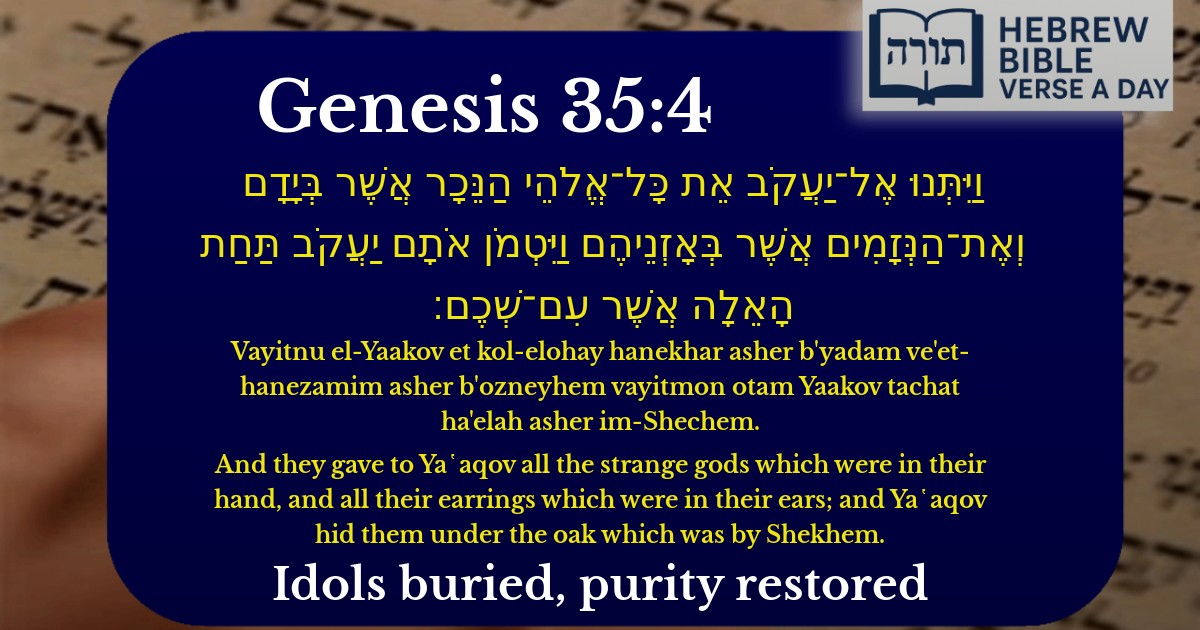Join Our Newsletter To Be Informed When New Videos Are Posted
Join the thousands of fellow Studends who rely on our videos to learn how to read the bible in Hebrew for free!
Hebrew Text
וַיִּתְּנוּ אֶל־יַעֲקֹב אֵת כָּל־אֱלֹהֵי הַנֵּכָר אֲשֶׁר בְּיָדָם וְאֶת־הַנְּזָמִים אֲשֶׁר בְּאָזְנֵיהֶם וַיִּטְמֹן אֹתָם יַעֲקֹב תַּחַת הָאֵלָה אֲשֶׁר עִם־שְׁכֶם׃
English Translation
And they gave to Ya῾aqov all the strange gods which were in their hand, and all their earrings which were in their ears; and Ya῾aqov hid them under the oak which was by Shekhem.
Transliteration
Vayitnu el-Yaakov et kol-elohay hanekhar asher b'yadam ve'et-hanezamim asher b'ozneyhem vayitmon otam Yaakov tachat ha'elah asher im-Shechem.
Hebrew Leining Text
וַיִּתְּנ֣וּ אֶֽל־יַעֲקֹ֗ב אֵ֣ת כׇּל־אֱלֹהֵ֤י הַנֵּכָר֙ אֲשֶׁ֣ר בְּיָדָ֔ם וְאֶת־הַנְּזָמִ֖ים אֲשֶׁ֣ר בְּאׇזְנֵיהֶ֑ם וַיִּטְמֹ֤ן אֹתָם֙ יַעֲקֹ֔ב תַּ֥חַת הָאֵלָ֖ה אֲשֶׁ֥ר עִם־שְׁכֶֽם׃
וַיִּתְּנ֣וּ אֶֽל־יַעֲקֹ֗ב אֵ֣ת כׇּל־אֱלֹהֵ֤י הַנֵּכָר֙ אֲשֶׁ֣ר בְּיָדָ֔ם וְאֶת־הַנְּזָמִ֖ים אֲשֶׁ֣ר בְּאׇזְנֵיהֶ֑ם וַיִּטְמֹ֤ן אֹתָם֙ יַעֲקֹ֔ב תַּ֥חַת הָאֵלָ֖ה אֲשֶׁ֥ר עִם־שְׁכֶֽם׃
🎵 Listen to leining
Parasha Commentary
📚 Talmud Citations
This verse is quoted in the Talmud.
📖 Avodah Zarah 44a
The verse is referenced in a discussion about the prohibition of idol worship and the actions of Jacob in removing foreign gods from his household.


Context of the Verse
The verse (Bereishit 35:4) describes the actions of Yaakov's household after the incident of Dinah in Shechem. Following the episode, Yaakov instructs his family to rid themselves of foreign idols and purify themselves before returning to Beit-El (Bethel), where he had previously made a vow to Hashem (Bereishit 28:20-22).
Removal of Foreign Gods
Rashi explains that the "strange gods" (אֱלֹהֵי הַנֵּכָר) refer to idols that were in the possession of Yaakov's household, possibly acquired during their time among the Canaanites. The Midrash (Bereishit Rabbah 81:1) suggests that even Rachel had taken her father Lavan's terafim (household idols) when she left his home (Bereishit 31:19), and now, under Yaakov's leadership, the entire household relinquished them.
Significance of the Earrings
The earrings (נְזָמִים) are mentioned because they were often used in idol worship, as ornaments for pagan deities (see Ramban on this verse). The Talmud (Avodah Zarah 44a) discusses how jewelry could be associated with avodah zarah (idolatry), and thus, Yaakov ensured their removal as part of the spiritual purification process.
Yaakov's Action: Hiding the Idols
Yaakov did not destroy the idols but buried them under the oak tree near Shechem. Ramban explains that this was a deliberate act to prevent others from finding and misusing them. The oak tree (אֵלָה) is significant—some commentaries (Ibn Ezra) note that it was a well-known landmark, ensuring that no one would accidentally unearth the idols.
Spiritual Renewal
This episode marks a pivotal moment of teshuvah (repentance) for Yaakov's household. The removal of foreign gods symbolizes their recommitment to monotheism and the covenant with Hashem. The Midrash (Pirkei DeRabbi Eliezer 35) connects this to the future commandment in Devarim (7:25-26) to destroy idols completely, showing Yaakov's foresight in distancing his family from spiritual contamination.
Lessons for Future Generations